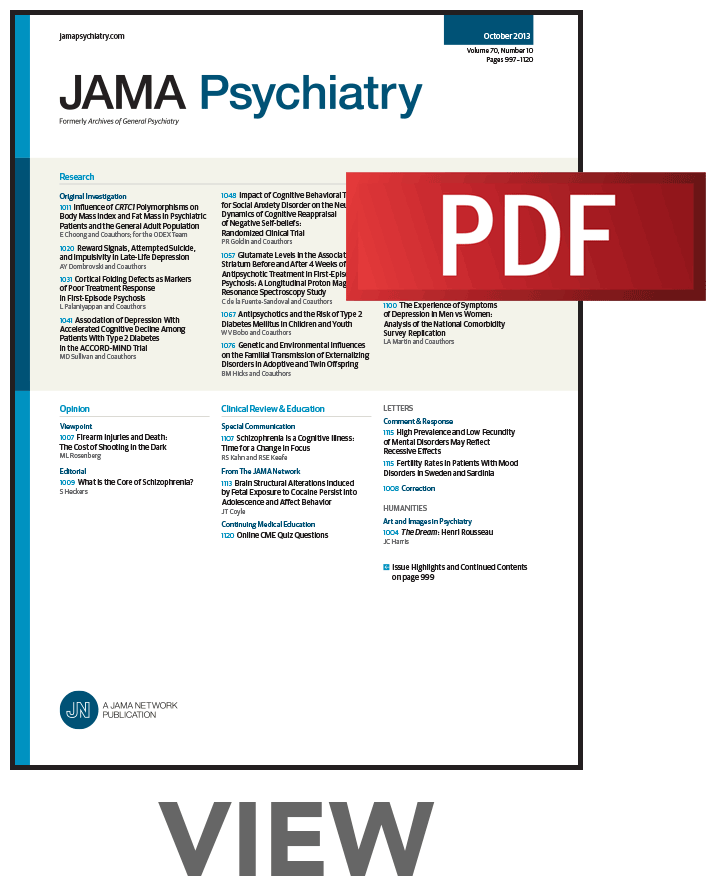A Dynamical Systems View of Psychiatric Disorders—Theory
IF 22.5
1区 医学
Q1 PSYCHIATRY
引用次数: 0
Abstract
ImportancePsychiatric disorders may come and go with symptoms changing over a lifetime. This suggests the need for a paradigm shift in diagnosis and treatment. Here we present a fresh look inspired by dynamical systems theory. This theory is used widely to explain tipping points, cycles, and chaos in complex systems ranging from the climate to ecosystems.ObservationsIn the dynamical systems view, we propose the healthy state has a basin of attraction representing its resilience, while disorders are alternative attractors in which the system can become trapped. Rather than an immutable trait, resilience in this approach is a dynamical property. Recent work has demonstrated the universality of generic dynamical indicators of resilience that are now employed globally to monitor the risks of collapse of complex systems, such as tropical rainforests and tipping elements of the climate system. Other dynamical systems tools are used in ecology and climate science to infer causality from time series. Moreover, experiences in ecological restoration confirm the theoretical prediction that under some conditions, short interventions may invoke long-term success when they flip the system into an alternative basin of attraction. All this implies practical applications for psychiatry, as are discussed in part 2 of this article.Conclusions and RelevanceWork in the field of dynamical systems points to novel ways of inferring causality and quantifying resilience from time series. Those approaches have now been tried and tested in a range of complex systems. The same tools may help monitoring and managing resilience of the healthy state as well as psychiatric disorders.精神病的动态系统观点--理论
重要意义精神疾病可能时好时坏,症状在人的一生中不断变化。这表明诊断和治疗模式需要转变。在此,我们从动力系统理论中汲取灵感,提出了一种全新的观点。在动态系统观点中,我们提出健康状态有一个代表其恢复力的吸引盆地,而失调则是系统可能陷入其中的替代吸引器。在这种方法中,恢复力是一种动态属性,而不是一种不可改变的特性。最近的研究表明,弹性的通用动态指标具有普遍性,目前已在全球范围内用于监测热带雨林和气候系统临界要素等复杂系统的崩溃风险。生态学和气候科学还使用其他动力系统工具,从时间序列中推断因果关系。此外,生态恢复方面的经验也证实了这一理论预测,即在某些条件下,当短期干预将系统带入另一个吸引力盆地时,可能会取得长期成功。正如本文第二部分所讨论的那样,所有这些都意味着在精神病学中的实际应用。结论与相关性动态系统领域的工作指出了从时间序列中推断因果关系和量化复原力的新方法。这些方法现已在一系列复杂系统中得到尝试和检验。同样的工具可能有助于监测和管理健康状态和精神障碍的恢复力。
本文章由计算机程序翻译,如有差异,请以英文原文为准。
求助全文
约1分钟内获得全文
求助全文
来源期刊

JAMA Psychiatry
PSYCHIATRY-
CiteScore
30.60
自引率
1.90%
发文量
233
期刊介绍:
JAMA Psychiatry is a global, peer-reviewed journal catering to clinicians, scholars, and research scientists in psychiatry, mental health, behavioral science, and related fields. The Archives of Neurology & Psychiatry originated in 1919, splitting into two journals in 1959: Archives of Neurology and Archives of General Psychiatry. In 2013, these evolved into JAMA Neurology and JAMA Psychiatry, respectively. JAMA Psychiatry is affiliated with the JAMA Network, a group of peer-reviewed medical and specialty publications.
 求助内容:
求助内容: 应助结果提醒方式:
应助结果提醒方式:


